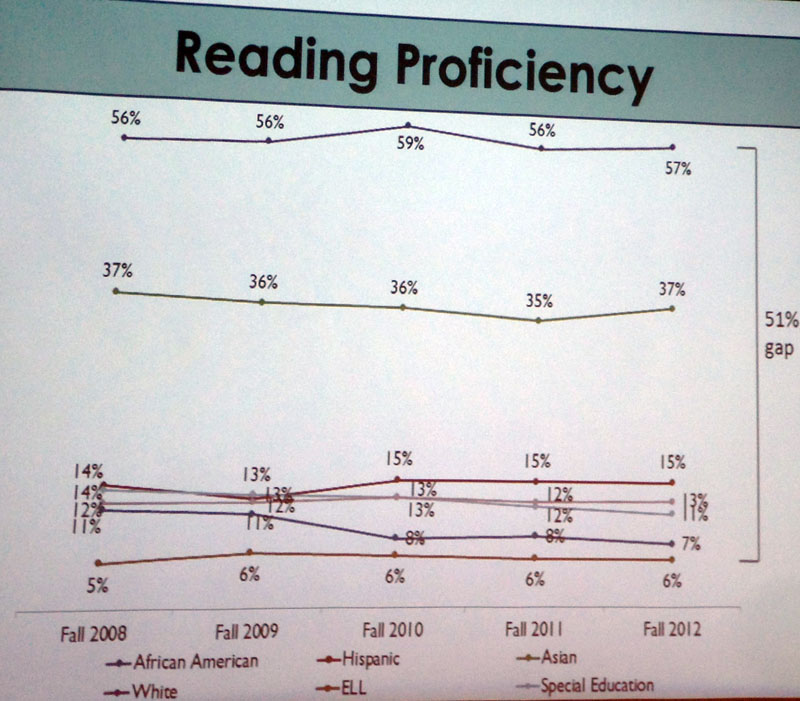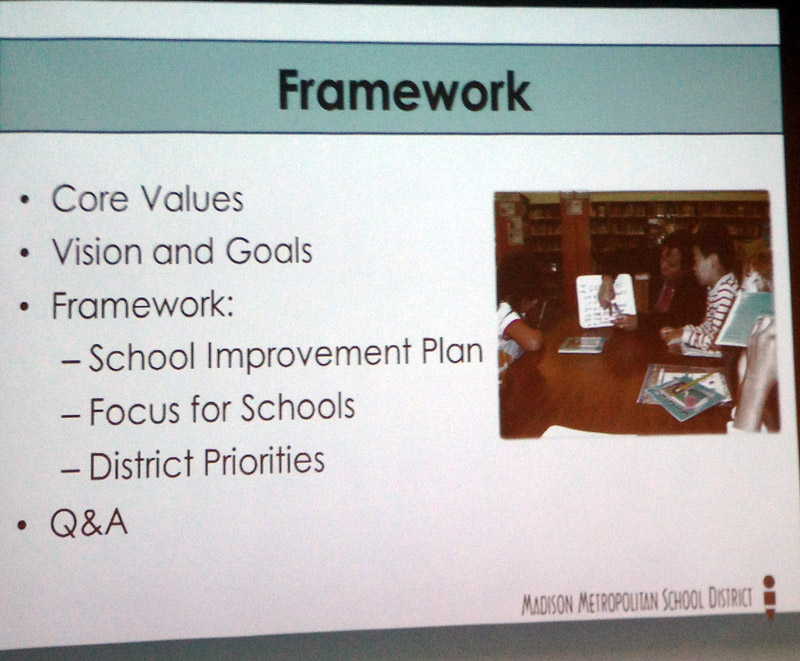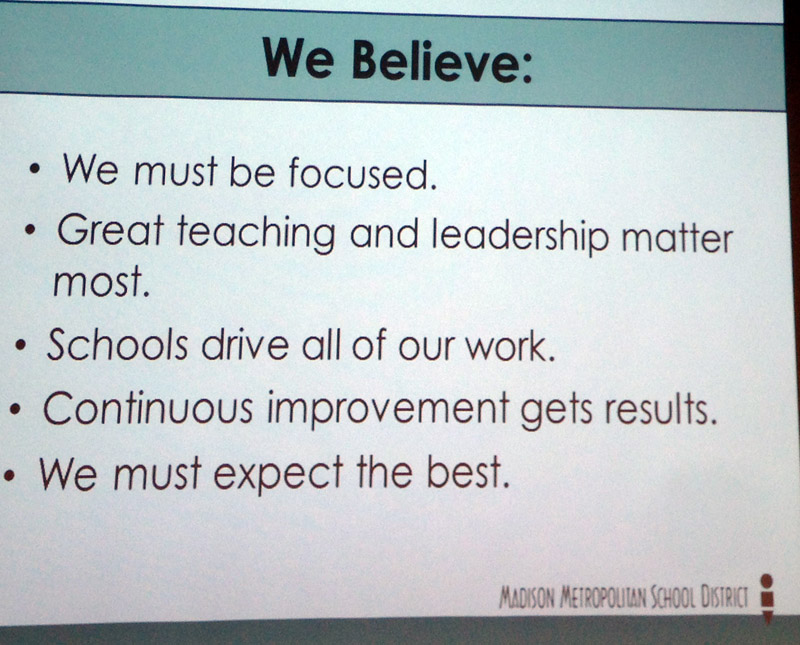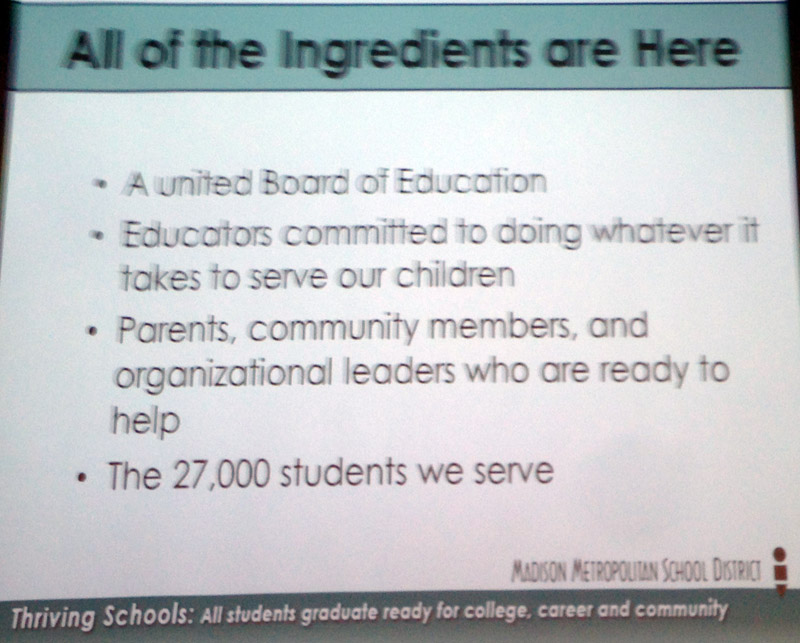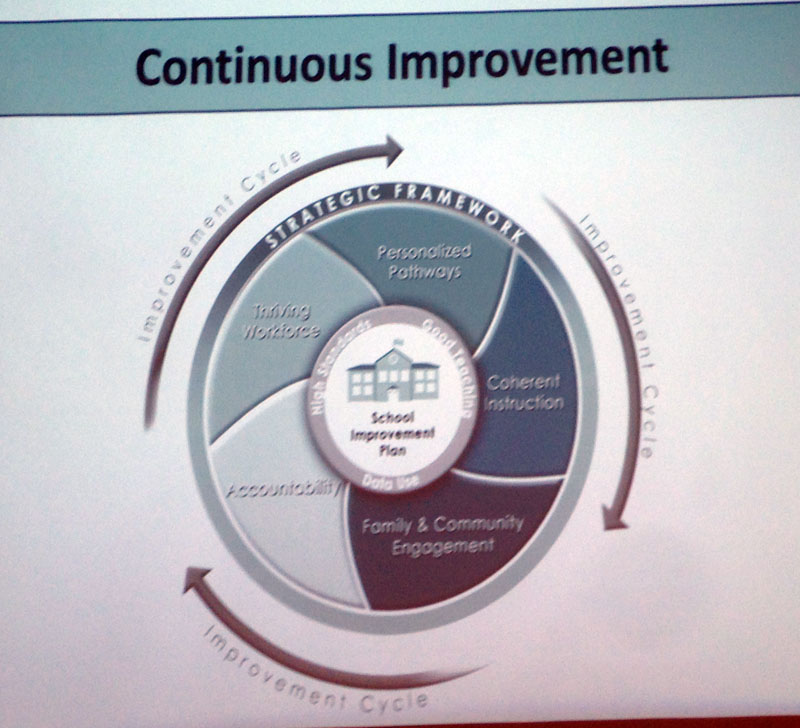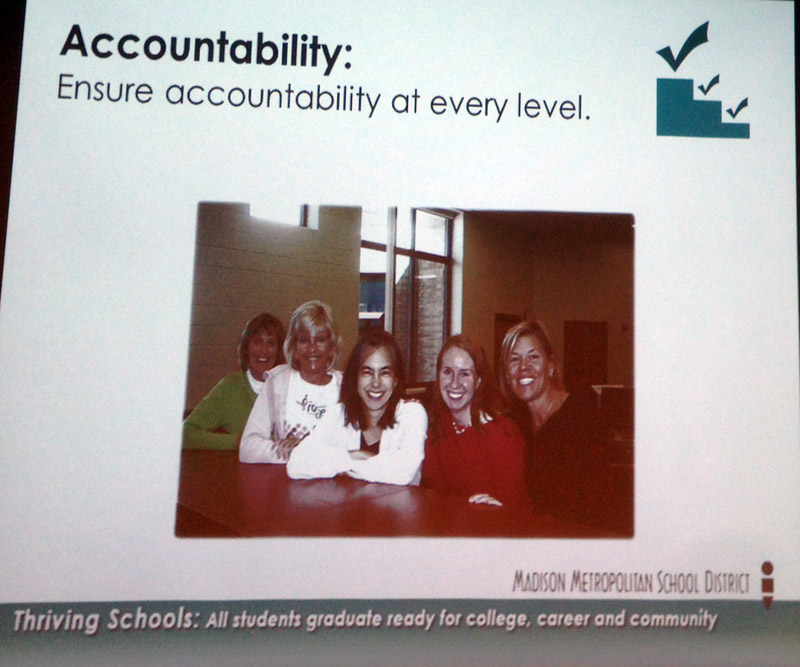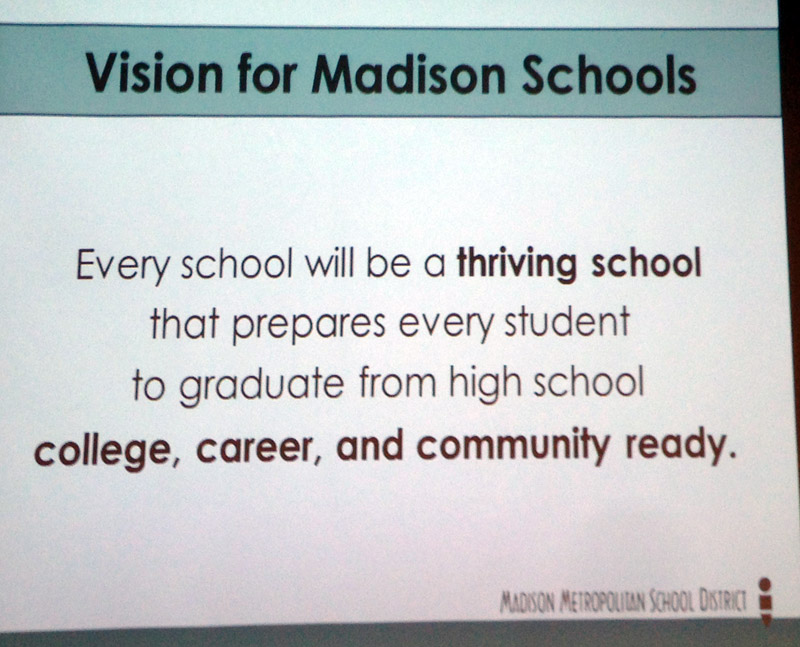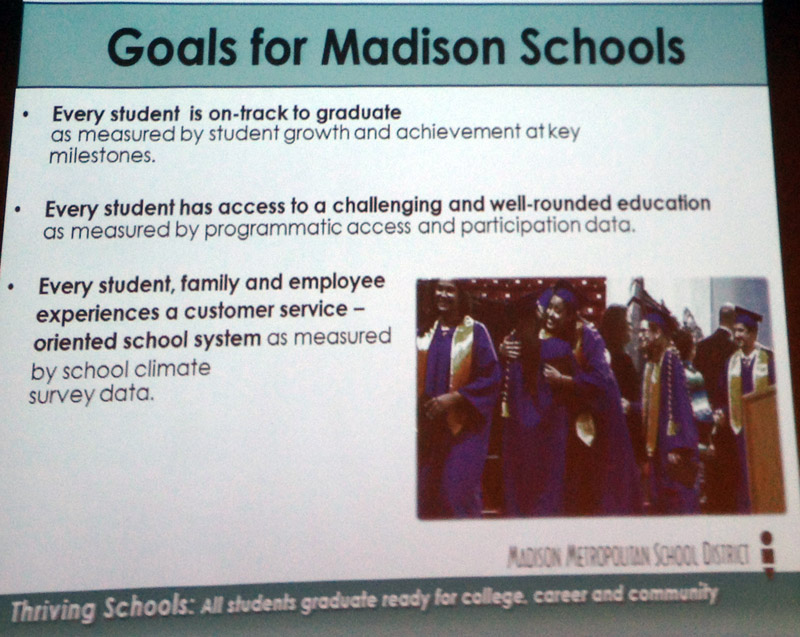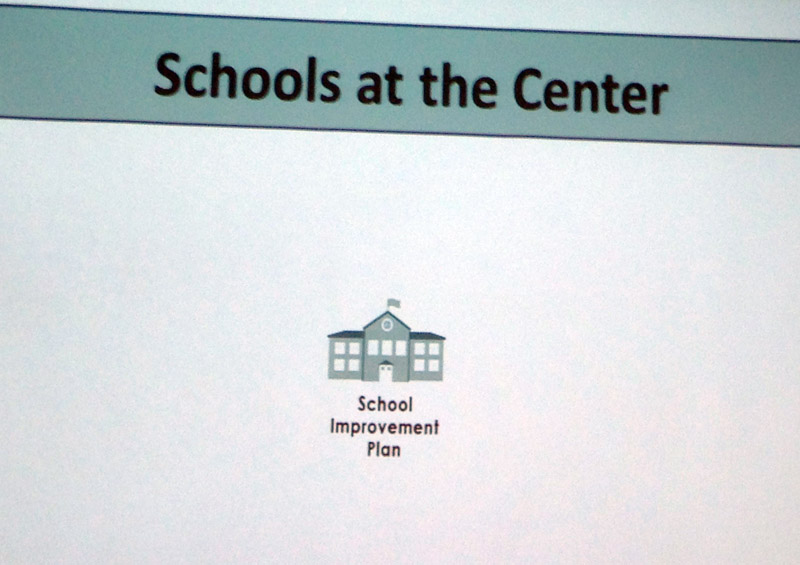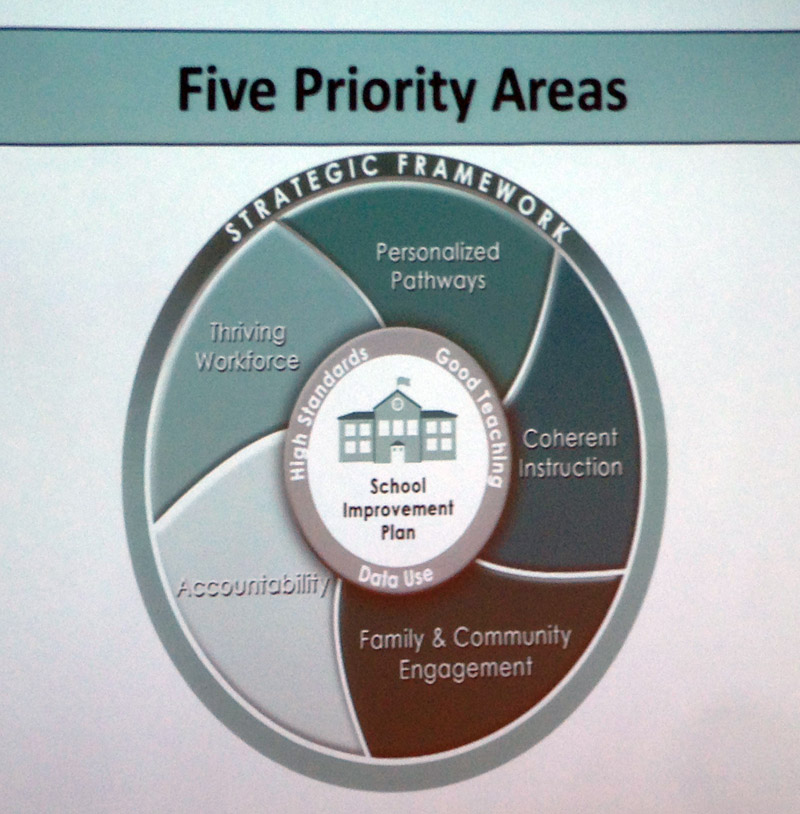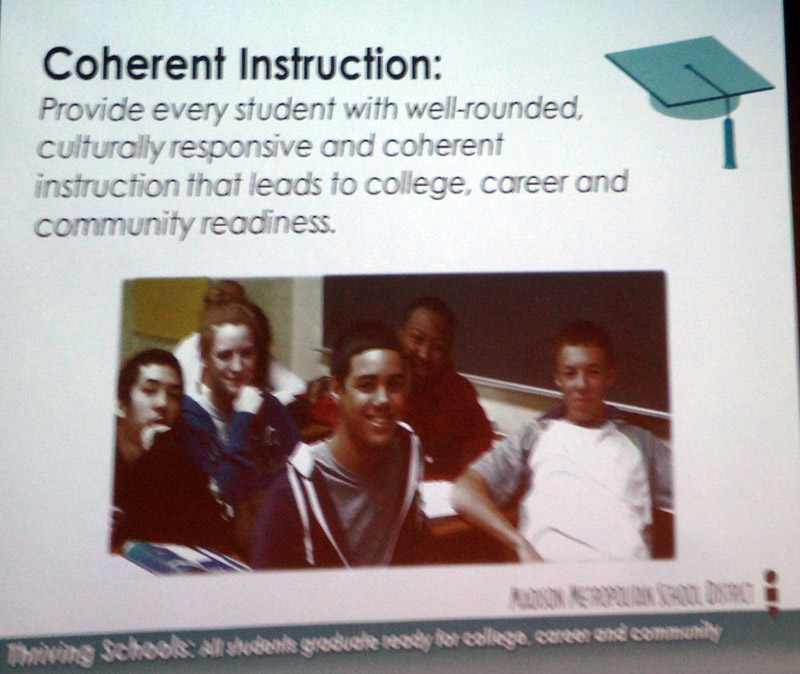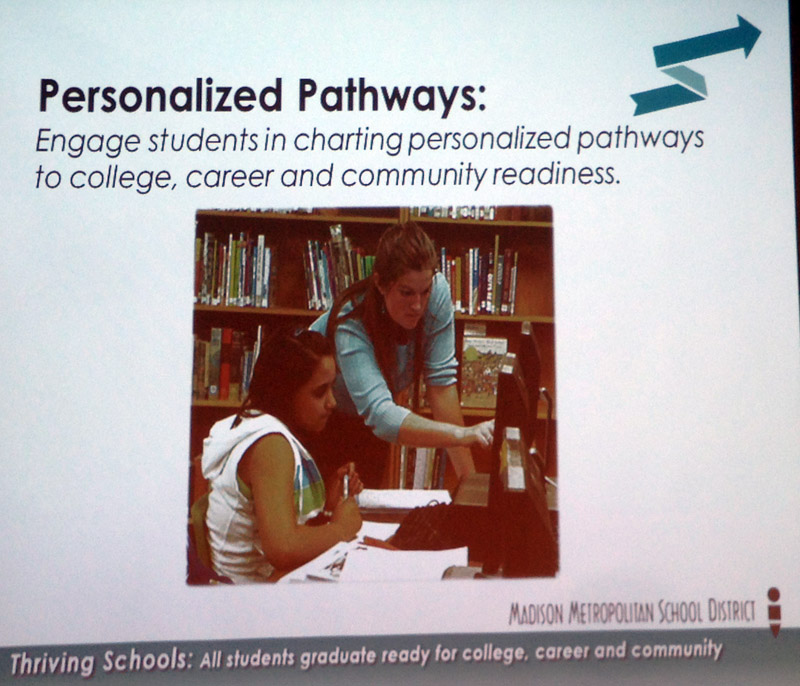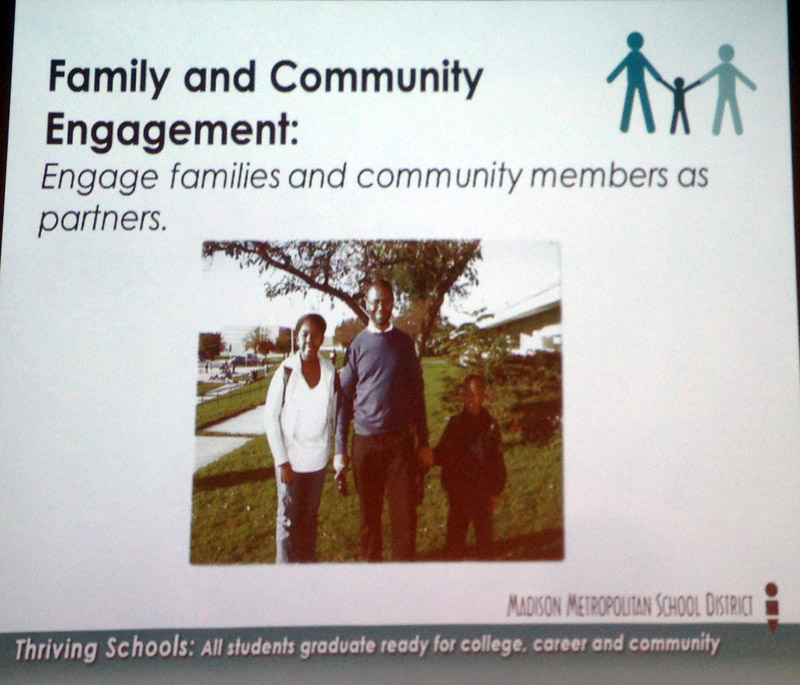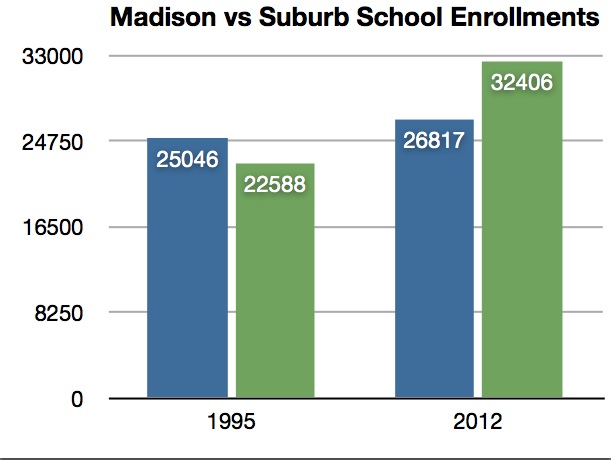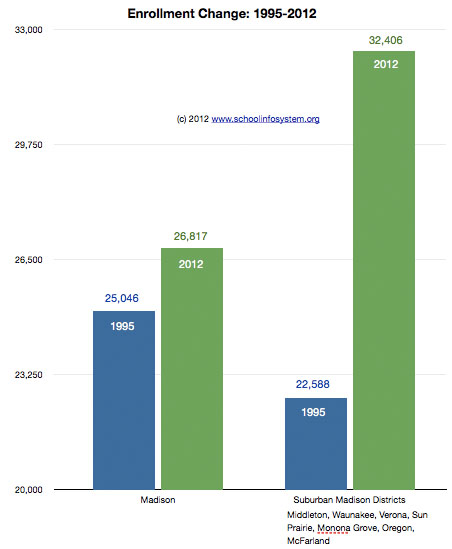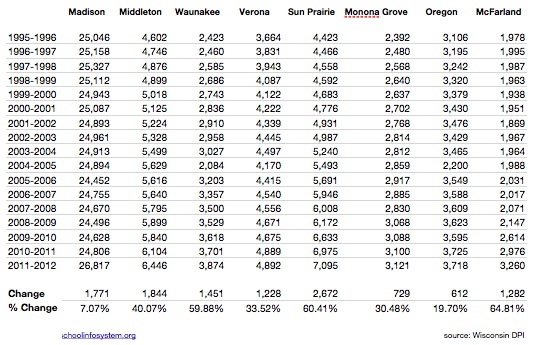APPENDIX MMM-7-21 January 31, 2011
Urban League of Greater Madison
SUMMARY
On December 6, 2010, the Urban League of Greater Madison presented an initial proposal for the establishment of Madison Preparatory Academy for Young Men (a non-instrumentality all-boys secondary charter school) to the Planning and Development Committee of the MMSD Board of Education. During the discussion that followed, Board members agreed to submit follow-up questions to the Urban Leagne, to which the Urban Leagne would respond before the next meeting of the Planning and Development Committee. Questions were submitted by Ed Hughes and Lucy Mathiak. Furthermore, Arlene Silveira submitted questions presented to her by several connnunity members. Below each numbered Board member question, you will find the ULGM response.
1. Ed Hughes: Do you have a response to the suggestion that your proposal may violate Wis. Stat. sec. 118.40(4)(c) other than that you also intend sometime in the future to develop and operate a school for girls? If so, what is the response?
ULGM: Please refer to our letter to MMSD Board of Education members that responded to the ACLU’s opposition to Madison Prep. The answer to your question is contained in that letter. We have attached the letter to this document for your review.
2. Ed Hughes: To the extent the information is available to you, please list the 37 or so non instrumentality charter schools currently operating in Wisconsin.
ULGM: The following list of non-instrumentality charter schools currently operating in Wisconsin was compiled from the 20 I 0-20 II Charter Schools Yearbook published by the Department of Public Instruction. You can find the complete Yearbook online at: http://dpi.wi.gov/sms/pdf/2010.llyearbook.pdf
1. Barron, North Star Academy
2. Cambridge, JEDI Virtual High School
3. City of Milwaukee, Central City Cyberschool
4. City of Milwaukee, Darrell Lynn Hines (DLH) Academy
5. City of Milwaukee, Downtown Montessori Academy
6. City of Milwaukee, King’s Academy
7. City of Milwaukee, Milwaukee Academy of Science
8. Grantsburg, Insight School of Wisconsin
9. Hayward, Hayward Center for Individualized Learning
10. Hayward, Waadookodaading Charter School
11. McFarland, Wisconsin Virtual Academy
12. Milwaukee, Carmen High School of Science and Technology
13. Milwaukee, Highland Community School
14. Milwaukee, Hmong American Peace Academy (HAPA)
15. Milwaukee, International Peace Academy
16. Milwaukee, La Causa Charter School
17. Milwaukee, Milwaukee Community Cyber (MC2) High School
18. Milwaukee, Next Door Charter School
19. Milwaukee, Wings Academy
20. Milwaukee, Wisconsin Career Academy
21. Nekoosa, Niikuusra Community School
22. New Lisbon, Juneau County Charter School
23. New Richmond, NR4Kids Charter School
24. Sheboygan, Lake Country Academy
25. UW-Milwaukee, Bruce Guadalupe Community School
26. UW-Milwaukee, Business & Economics Academy of Milwaukee (BEAM)
27. UW-Milwaukee, Capitol West Academy
28. UW-Milwaukee, Milwaukee College Preparatory School
29. UW-Milwaukee, Milwaukee Renaissance Academy
30. UW-Milwaukee, School for Early Development & Achievement (SEDA)
31. UW-Milwaukee, Seeds of Health Elementary School
32. UW-Milwaukee, Tenor High School
33. UW-Milwaukee, Urban Day Charter School, Inc
34. UW-Milwaukee, Veritas High School
35. UW-Milwaukee, Woodlands School
36. UW -Milwaukee, YMCA Young Leaders Academy
37. UW-Parkside, 21st Century Preparatory School
38. Weyauwega-Fremont, Waupaca County Charter School
3. Ed Hughes: Do you have copies of any of the contracts Wisconsin non-instrumentality charter schools have entered into with their school districts? If so, please list the contracts and provide a copy of at least one of them.
ULGM: See attached contracts for Lake Country Academy in Sheboygan and the Wisconsin Virtual Academy in McFarland, which are both non-instrumentality charter schools.
4. Ed Hughes: To the extent the information is available to you, please list the amount ofper.student payment each non-instrumentality charter school in Wisconsin is contractually entitled to receive from its sponsoring school district.
ULGM: We have requested information from the DPI on the current per-student payments to each non-instrumentality charter school in Wisconsin, but we understand that DPI does not now have the information consolidated in one database. We expect that the per-student payment information will be available from DPI by January 17, and we will submit that information to the board and administration as soon as it becomes available from the DPI. The per-pupil payment to each district.authorized charter school in Wisconsin, including instrumentality and non-instrumentality charter schools, is determined through negotiations and mutual agreement between the school district, as the charter school authorizer, and the charter school developer/operator.
5. Ed Hughes: Please identify the minimum per-student payment from the school district that would be required for Madison Prep to be financially feasible from your perspective. If you don’t have a specific figure, provide your best estimate of the range in which that figure is likely to fall.
ULGM: The MMSD Superintendent and Assistant Superintendent-Business in agreement with us that more time is needed to present a projected minimum payment from the school district. DPI’s School Finance Data Warehouse indicates that MMSD reported $14,432 in revenue per student and spent $13,881 per student iu 2008-09. We are certain that we will not request more per student than what MMSD spends annually.
6. Lucy Mathiak: Do you know what Madison Prep will cost the district? And do you know where the money will come from?
ULGM: We have an idea ofwhat our school will cost but as stated in the answer to question number 5, we are working through several costs and line items with MMSD’s Superintendent and Assistant Superintendent-Business. In Wisconsin, public charter schools are funded primarily by school districts or the state legislature (non-school district authorized schools). Generally, private funding is limited to 5% of costs during the budgeting process. However we will raise significantly more in private funding during the pre-implementation and implementation years of the school than we will in out years.
7. Lucy Mathiak: How the financial commitment asked of the district compares to the financial commitment to its existing schools?
ULGM: Assuming you mean existing traditional public schools, we will require more information from MMSD’s administration to make this comparison. Given that Madison Prep will be a new school and a non-instrumentality, there will be costs that Madison Prep has that the school system does not, and vice versa. However, we are firmly committed to ensuring our school is operated within the annual per pupil cost MMSD now spends to educate students in middle and high schools.
8. Community Member, via Arlene Silveira: First of all, has the funding that is indicated as part of the proposal actually been acquired or promised? The proposal indicates $100,000/ year from the Madison Community Foundation, but I can’t find any information from MCF itself about funding Madison Prep. All I can see is that they donated to the Urban League’s capital and Workforce campaigns. Will you check into this? Also, the proposal indicates $250,000/ year for 3 years from Partners for Developing Futures. Last year, despite having received 25 applications for funding from “education entrepreneurs,” this organization did not fund any of them due to the quality of the applications. How is the Madison Prep planning team able to claim this as a source of funding? Have promises been made?
ULGM: The Madison Community Foundation and Partners for Developing Futures were listed as potential revenue sources; these dollars were not committed. Our business plan followed the same approach as most business plans for start-up initiatives: listing prospective revenue sources. However, we do intend to pursue funding through these and other sources. Our private fundraising goals and needs in our five-year budget plan are reasonable.
9. Lucy Mathiak: What additional resources are needed to make the Madison Prep model work?
ULGM: Our school is designed as a demonstration school to be replicable, in whole or in part, by MMSD and other school systems. Therefore, we will not request more than the district’s own annual costs per pupil at the middle and high school levels.
10. Lucy Mathiak: What resources are in hand and what resources will you need to raise?
ULGM: We presently have $50,000 to support the planning of the school, with the offer of additional support. However, we will secure additional private and public funding once the Board of Education formally approves the DPI planning grant application/detailed proposal for Madison Prep.
11. Lucy Mathiak: Ifthere is a proposed endowment, what is the amount of the endowment in hand, the estimated annual rate of return, and the estimated income available for use?
ULGM: New charter schools generally do not budget for endowment in their first few years of operation. We intend to build an endowment at some point and have line items for this in Madison Prep’s budget, but these issues will be decided by the Board ofDirectors ofthe school, for which we will not begin recruiting until the Board of Education approves our DPI plauning grant application/detailed proposal.
12. Ed Hughes: Which parts of your proposal do you require non-instrumentality status to implement?
ULGM: Non-instrumentality status will be vital to Madison Prep’s ability to offer an extended school day, extended school year, as well as the expectations we have of teachers to serve as mentors and coaches to students. The collective bargaining contract between the Board of Education and Madison Teachers, Inc. would not allow for this added instructional time. Yet this added instructional time will be necessary in order for students to meet Madison Prep’s ambitious achievement goals. In addition, our professional development program will also require more hours of training. We also intend to implement other special activities for students and faculty that would not be allowed under MMSD and MTI’s collective bargaining agreement.
13. Ed Hughes: What will be the school’s admission policy? Please describe any preferences that the admission policy will include. To what extent will students who live outside ofthe Madison school district be considered for admission?
ULGM: Madison Prep will comply with all federal and state regulations relating to charter school admissions. In its inaugural school year (20 12-20 13), Madison Prep will be open to any 61h and 7’h grade male student residing within the boundaries of MMSD.
All interested families will complete an Enrollment Form at the Urban League’s offices, online, during community meetings and outreach activities, through local partners, or during a visit to the school (after it opens). If Madison Prep receives less than 45 enrollment forms for either grade (6 and 7) in the tirst year, all students’ who applied will be admitted. If the school receives more than 45 enrollment forms for either grade level in the first year, or enrollment forms exceed the seats available in subsequent years, Madison Prep will hold a public random lottery at a location that provides enough space for applicant students and families. The lottery will be held in accordance with DPI guidelines for random lotteries. If Madison Prep does not fill all available seats, it will continue its grassroots recruitment efforts until it reaches its enrollment goal.
14. Community Member, via Arlene Silveira: We know that Madison Prep won’t accept girls. Will it except boys with Autism or Aspergers? If a boy has a learning disability, will he be allowed to attend? What ifthis learning disability makes it not possible for him to perform above grade level on a standardized test? Will he be allowed in? And can they kick him out if his test scores aren’t advanced/proficient?
ULGM: Please see our answer to question #13. To be clear, Madison Prep will accept students with special learning needs, including students who speak English as a second language. As always, IEP teams will determine on a case-by-case basis if Madison Prep is an appropriate placement for special education students. No Madison Prep student will ever be expelled for academic performance.
15. Ed Hughes: An attraction ofthe proposed school is that it could provide the kind ofiutense academic and other sorts of support that could change the trajectories of its students from failure to success. How will you ensure that your school serves primarily students who require the sort of approach the school will offer in order to be successful?
ULGM: Please see our answer to question #13 and question #16 below. We will go to great lengths to inform parents about Madison Prep as an option for their child, and to recruit students and families to our school. We will over-market our efforts in low-income communities and through media, sports clubs, community centers, churches, employers, and other vehicles that reach these students and their parents. We are also exploring the legality of our ability to set an income goal or threshold for student admissions. Nonetheless, we believe that any young man, regardless of their family background, would be well served by Madison Prep.
16. Ed Hughes: To the extent yon know them, describe what the school’s stndent recruitment and marketing strategies will be.
ULGM: Madison Prep’s marketing plan will support three priorities and goals:
1. Enrollment: Recruiting, retaining, and expanding student enrollment annually -share Madison Prep with as many parents and students as possible and establish a wait-list of at least 20 students at each grade level by June I each year (with the exception of year one).
2. Staffing: Recruiting and retaining a talented, effective, and committed faculty and staff -field qualified applicants for each position in a timeframe that enables us to hire by June 30 each year.
3. Public Image and Support: Building, maintaining, and solidifying a base of support among local leaders, financial contributors, key partners, the media, and the general public.
To ensure the public is well acquainted with the school, Madison Prep, with the support of the Urban League of Greater Madison, will make use of a variety of marketing strategies to accomplish its enrollment, staffing, fundraising, and publicity goals. Each strategy will be phased in, from pre.launch of the school through the first three years of operation. These marketing strategies are less expensive and more sustainable with the budget of a new charter school than television, radio, and popular print advertisements. They also deliver a great return on investment if executed effectively. Each strategy will enable Madison Prep, with its limited staff, to promote itself to the general public and hard-to-reach communities, build relationships, sustain communications and achieve its goals.
A. Image Management: Madison Prep’s logo and images of young men projecting the Madison Prep brand will be featured on the school’.s website, in informational and print materials, and on inexpensive paraphernalia (lapel pins, emblems, ink pens, etc). Students will be required to wear uniforms that include a red or black blazer featuring the Madison Prep emblem, a sweater, a red or black tie, white shirt, black or khaki pants, and black or brown dress shoes. They will also have a gym uniform and athletic team wear that features the Madison Prep emblem. Additionally, Madison Prep will ensure that its school grounds, educational facility, and learning spaces are clean, orderly and well-maintained at all times, and that these physical spaces reflect positive images of Madison Prep students, positive adult males, community leaders, families, and supporters. Madison Prep’s Core Values will be visible through the school as well, and its students, faculty, staff, and Board of Directors will reflect an image in school and in public that is consistent with the school’s Core Values and Leadership Dimensions.
B. Grassroots Engagement: Madison Prep’s founders, Board members, volunteers, and its key staff (once hired) will go door-to-door in target neighborhoods, and other areas within MMSD boundaries where prospective candidates can be found, to build relationships with young men, families, and local community resource persons and advocates to recruit young men to attend Madison Prep. Recruiters will be dressed in the Madison Prep uniform (either a polo shirt, sweater or suit jacket/tie, each showing the Madison emblem, and dress slacks or skirt) and will visit homes in two person teams.
Madison Prep will also partner with City Council members, Advisory Neighborhood Commissioners, and local libraries to host community meetings year-round to promote the school in target neighborhoods and military bases. It will also promote the school to citizens in high traffic residential areas of the city, including metro stops, restaurants, community centers, community health agencies, and at public events. Madison Prep will engage the religious community as well, promoting the school to church leaders and requesting to speak before their congregations or have the church publicize the school during their announcements on Sundays and ministry activities during the week. Area businesses, hospitals, government agencies, foster care agencies, and mentorship programs will be asked to make information available to their patrons, clients, and families. Madison Prep will also seek to form partnerships with the Police Department and Court System to ensure judges, attorneys, neighborhood police officers, and family advocates know about the school and can make referrals of young men they believe will benefit from joining Madison Prep’s school community.
C. Online Presence & Partnerships: Madison Prep will launch a website and update its current Facebook and Twitter pages prior ·to the school opening to expand its public presence. The Facebook page for Madison Prep presently has more than 100 members, has been operational for less than 2 months, and has not yet been widely marketed. The page is used to raise awareness, expand support, communicate progress, announce activities and events, and promote small-donor fundraising campaigns. The website will be used to recruit students, staff, and eventually serve as an entry-point to a member only section on the Internet for faculty, students, and parents. Madison Prep will also seek to establish strategic alliance partnerships with service associations (100 Black Men, Sororities and Fraternities, Civic Clubs or Organizations, etc.), enlisting their participation in the school’s annual events. In addition, Madison Prep will establish partnerships with other public and private schools in the Madison area to recruit students, particularly elementary schools.
D. Viral Marketing: Madison Prep will use email announcements and social networking sites to share its mission, activities, employment opportunities, and successes with its base of supporters and will inspire and encourage them to share the information with their friends, colleagues, parents and young men they know who might be interested in the school. Madison Prep will add to its base of supporters through its other marketing strategies, collecting names and contact information when and where appropriate.
E. Buzz Marketing: Madison Prep will use subtle forms of marketing to recruit students and faculty, increase its donor and support base, and develop a positive public image. The school will maintain an influential board of directors and advisors, will engage notable people and organizations in the school, and will publicize these assets to the general public. The school will also prepare key messages and strategically involve its students, staff, and parents in key events and activities to market its brand -high achieving, thoughtful, forward thinking, confident and empowered young men who are being groomed for leadership and success by equally talented, passionate and committed adults. The messages, images, and quality of interactions that the broader community has with members of the greater Madison community will create a positive buzz about the school, its impact, and the success of its students.
F. School Visits & Activity Participation: Each year, from the week after Thanksgiving through the end of the school year, Madison Prep will invite prospective students and parents, funders, and members of the community to visit the school. A visit program and weekly schedule will be established to ensure that the school day and learning is not interrupted by visitors. Madison Prep will also establish an open visit policy for parents, and will create opportunities for them to leverage their ongoing involvement with the school and their young men. Through nurturing positive relationships with parents, and establishing an enviromnent where they are wanted and respected, Madison Prep will create spokespersons in the community who help grow its student body and community support. Finally, Madison Prep will host an annual community event that engages its school community with the greater Madison community in a day of fun, competitive events for families, and will serve as a resource to parents whose children do not attend Madison Prep by inviting them to participate in its Destination Planning workshops.
G. Popular Media: Madison Prep will allocate resources to market itself on Urban and News Radio during the peak student recruitment season in two phases. Phase I will take place in November 2011 and Phase 2 advertising will take place between Jannary and May 2012. To defray costs, Madison Prep will enlist the support of local and national celebrities for feature interviews, spotlights, and PSAs with Madison Prep’s Leadership to promote the school.
17. Community Member, via Arlene Silveira: It looks like the Charter school is aiming for 50% of its population to be low-income. The middle school my children will go to, Sherman, is 71% low income. Blackhawk is at 62%. Wright is 83%. Sennett is 65%. Cherokee is at 63%. Toki is at 51%. Can we, in good conscious, start a new school-designed to help low income students -that has a lower percentage oflow-income students than six of our existing middle schools?
ULGM: The Urban League has set the 50% low-income target as a floor, not as a ceiling. In fact, we expect that more than 50% of Madison Prep students will qualifY for free or reduced lunch.
Furthermore, we have chosen to use the 50% figure to allow us to be conservative in our budgeting process. No matter what the level of low income students at Madison Prep -50% or higher-the student achievement goals and overall program quality will remain unchanged.
18. Ed Hughes: Have you considered limiting admission to students who have scored minimal or basic on their WKCE tests?
ULGM: No. Madison Prep will be open to any male student who wishes to attend, regardless of past academic performance.
19. Ed Hughes: Some have suggested that Madison Prep could skim offthe most academically.motivated African-American students from the District’s middle and high schools, leaving fewer role models and academic peers for the African-American boys who remain in our existing schools. What is your response to that concern?
ULGM: The notion that charter schools skim off the most motivated students is a common misconception. First, this argument is not logical. Parents/caregivers ofchildren who are academically motivated and doing well in traditional public schools have little incentive to change their students’ educational environment. Those kids will likely stay put. When a parent, teacher, social worker, or school counselor recognizes that a child isn’t doing well in the traditional school and seeks an alternative, the charter school that is sought as an alternative does not in this process gain some advantage. In fact, research suggests the opposite. A 2009 study by researchers at Michigan State University, the University of Wisconsin, and Mathematic Policy Research examined charter schools from across the country to test the “skimming” theory. The researchers found no evidence of skimming. In fact, they found students who go to charter schools typically have LOWER test scores than their counterparts in traditional public schools. (Read the full paper at http://www.vanderbilt.edu/schoolchoice/conference/papers/Zimmer_COMPLETE.pdf)
20. Ed Hughes: Have you extended preliminary or informal offers of employment at Madison Prep to anyone? If so, identify to whom the preliminary or informal offers were made and for which positions.
ULGM:No.
21. Ed Hughes: What will he your strategy for recruiting teachers? What qualifications will you establish for teachers? Please describe the general range of salary and benefits you expect to offer to teachers.
ULGM: Teacher Recruitment -The overarching goal of teacher recruitment will be to hire a highly qualified, passionate, hard-working, diverse staff. The recruitment effort will include casting a wide net that allows Madison Prep to draw from the pool oflocal teachers as well as teachers statewide and nationwide who will embrace the opportunity to help build a school from the ground up. We will recruit though typical both typical means (postings on our website, WECAN, charter school association job pages) as well as through recruitment fairs outside of the state. Our hiring process will take place in early and mid spring rather than late spring and summer so that we may have a competitive edge in recruiting the teachers that are the best fit for Madison Prep. While the Head of School will be responsible for the hiring of teachers, he/she will engage a committee of teachers, community members, parents, and students in the process ofselecting teachers and other staff. In addition to a thorough interview, teacher candidates will be required to teach a sample lesson to a group of students, as well as other interview committee members. Teacher Qualifications-All teachers at Madison Prep will be licensed by the Department of Public Instruction.
General Salary Range and Benefits*-For the 2012-2013 school year, the salary for Master Teachers (of which there will be two) is currently projected to be $61,406 with a signing bonus of $2,000 and a maximum performance bonus of $2,750. The salary for general education teachers is currently projected to be $50,055 for the 2012-2013 school year, with a signing bonus of$2,000 and a maximum performance bonus of$1,750. Madison Prep intends to provide a full range of benefits to its teachers. *Salary and bonus figures are subject to change
22. Ed Hughes: MMSD already has a charter middle school with a very diverse student population -James C. Wright Middle School. If the school district chose to continue James C. Wright as an instrumentality charter school but modeled on your Madison Prep proposal, which components of your proposal do yon think could be implemented at the school and which components of your proposal could not?
ULGM: The Urban League is not in a position to determine how the fundamental elements ofthe Madison Prep proposal could or could not be implemented at James C. Wright Middle School. That determination would have to be made by the district administration and c01mnunity at Wright.
23. Community Member, via Arlene Silveira: Here is the annual report from one of the Urban League charter schools that the proposal cites as a model for Madison Prep:
http://www.doe.mass.edu/charter/reports/2009/annual/0471.doc This is a report from the school’s lO'” year in existence. Please note the test achievement goals and scores on page 4 and compare them with the extremely overconfident goals of the Madison Prep proposal. IfMadison Prep is serious about attaining the goal of 75% oftheir students scoring 22 or higher on the ACT or 1100 or higher on the SAT, how do they plan to achieve this and what will happen with those students who fail to meet this standard? What will happen to the teachers who don’t meet their quota ofstudent test scores above this level? Please investigate these questions in detail and within the framework of Madison Prep processes from admissions through expulsion.
ULGM: The reference to the New Leadership Charter School in Springfield, Massachusetts in the Madison Prep initial proposal was meant to show the precedent for the establishment of charter schools by Urban League affiliates; the New Leadership Charter School is NOT a model for Madison Prep, nor was this ever stated in the initial proposal. That said, Madison Prep IS serious about our student achievement goals related to the ACT and SAT. We plan to meet these goals through-as the proposal states-an all-male student body, the International Baccalaureate Curriculum, college preparatory educational program, Harkness Teaching, an extended school day and year,mentoring and coll1111unity support, and a prep year. Students will be carefully assessed for years leading up to these tests to ensure their preparedness. When formative assessments indicate re-teaching is needed in order to meet the goal, students will receive further individualized instruction. Madison Prep teachers will not have student test score “quotas.”
24. Lucy Mathiak: What would a timeline for the counterpart girls’ school look like?
ULGM: We would like to initiate the process for the girls’ school in the fall of 2012, with an opening aimed at 2014-2015.
I continue to believe that the fate of this initiative will be a defining moment for the Madison School District. If approved and implemented, it will, over time, affect other traditional schools within the District. If it is rejected, a neighboring District will likely step in.
Finally, I found the Urban League’s response to Ed Hughes’ question #5 interesting:


